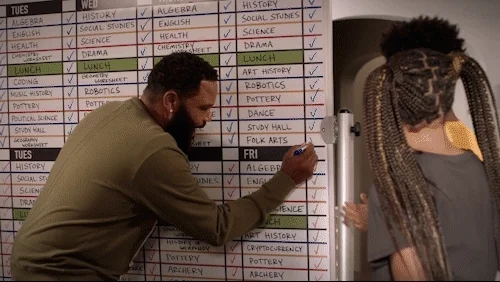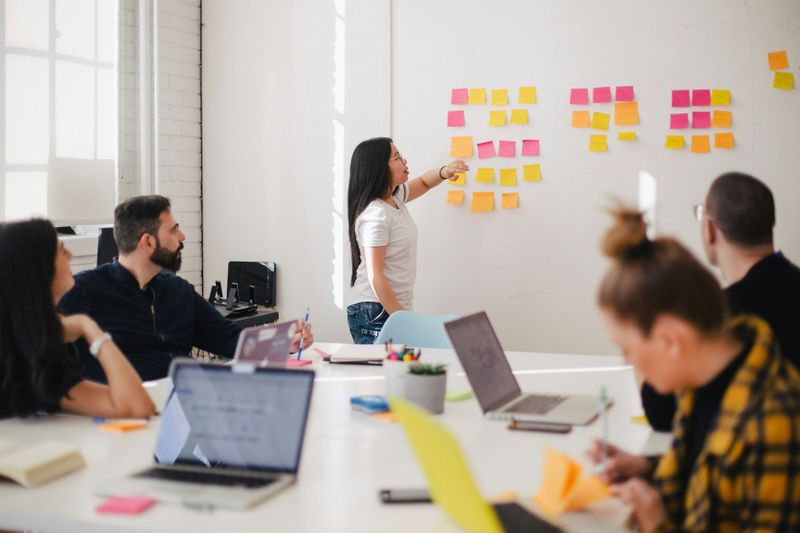
This logo isn't an ad or affiliate link. It's an organization that shares in our mission, and empowered the authors to share their insights in Byte form.
Rumie vets Bytes for compliance with our
Standards.
The organization is responsible for the completeness and reliability of the content.
Learn more
about how Rumie works with partners.
Are you a student looking to take on a leadership role in school study groups?
Or are you an educator seeking to enhance your skills in leading study groups?

If so, you're on the right track. Study groups, as a form of collaborative learning, help students develop critical thinking, reach higher levels of learning, and retain more information than studying alone.
These 6 study group facilitation techniques will help you lead study groups effectively.

1. Create a Plan
Planning for a study group helps establish clear goals and expectations.
Whether it’s for...
Preparing for an exam
Researching for a group project
Studying a challenging subject together
...students need to be on the same page so that everyone is working toward the same goals and can contribute effectively.

To achieve that, a plan should:
State meeting place and time
Break down tasks
Assign tasks to group members based on their strengths
Quiz: Creating a Plan
Five students formed a physics study group to help them better understand and master the classwork. As the group facilitator, you need to create a plan. Select all the steps that will contribute to making a good plan:
A. Since Henry has neat handwriting and good note-taking skills, he'll share and photocopy his notes from that week's physics class.
B. Other group members will take turns finding and printing out relevant questions, along with answer keys and explanations on a separate page.
C. The study group will meet every week after they've prepared the materials.
D. The group will meet to review the week's classwork with the help of Henry's notes, and then solve and discuss the questions.
Quiz
Select all the steps that will contribute to making a good plan:
A study group facilitator should set up a regular place and time to meet. For example, the study group will meet every Friday after school in their classroom. The other steps contribute to a good plan, as they help break down tasks and assign responsibilities to group members based on their strengths.
2. Manage Time
Set time limits for sessions and activities. This will help keep the group focused and on track. Using a timer can be an effective way to signal the transition to the next activity.
To make the most of study group sessions, also establish ground rules to minimize disruptions and distractions.
For example, some basic ground rules could be:
Be present
Be on time
Everyone participates
Be respectful of others

Quiz: Ground Rules
To make the most of study group sessions, which of the following can serve as good ground rules?
A. Prepare and organize learning materials in advance.
B. Be attentive and focused during study sessions.
C. Listen to others actively without interruption.
D. Make sure all questions are solved during a study session.
Quiz
Select all the choices that will make effective ground rules:
Effective ground rules should help a study group eliminate distractions and stay focused, making learning more efficient. Although it would be great to solve all the questions in a study session, it shouldn’t be a strict rule. Skipping the tough questions for later can be a smart way to stay efficient.
3. Prepare Tools
Preparation of necessary tools can help enhance learning by:
Increasing learning efficiency (finding tools on the spot is time-consuming)
Enhancing focus on key information through visual cues
Prepare tools according to the needs of the learning activities. Some common tools for a study group include:
Whiteboard
Flip chart
Various colored markers
Sticky notes
Pens and pencils

4. Foster Involvement and Active Participation
Everyone learns through active mental engagement. Ensure that every student has a chance to contribute and participate. The facilitation techniques to achieve this include:
Working in smaller groups, such as pairs or trios
Brainstorming
Using open-ended questions

Some other popular facilitation techiques to engage students include:

Pass the Question
One student asks a question related to the topic being studied, and then they pass it to another student who answers. The student who answers then asks the next question, keeping the conversation flowing.

Round Robin
Each student in the group is invited to share their opinions on the topic being discussed, without any interruptions from others.
5. Keep the Group Energized and Motivated
As a facilitator, you should monitor the energy levels and motivation of the group members, as keeping them energized and motivated can enhance learning efficiency and boost focus.
Some effective energizers are:
Stretch breaks
Refreshments

6. Go Virtual

In online universities and schools, classmates come together from around the world. Virtual study groups are quite common and can achieve learning outcomes that are just as effective as face-to-face interactions.
There are plenty of platforms and tools that can help you facilitate a virtual study group smoothly and effectively. The most common ones include, but are not limited to:
Google Docs/Drive

There are also many tools and platforms that can help create web-based virtual learning environments. Some of the most popular platforms include:
Online game-based learning platforms that allow users to create multiple-choice quizzes.
Poll Everywhere and Slido
Online interactive polling platforms that allow the audience to respond in real-time to polls or questions displayed by the presenter.
An app used to create presentations with real-time audience feedback.
A web-based virtual learning environment and learning management system.
 Photo by Kelly Sikkema on Unsplash
Photo by Kelly Sikkema on Unsplash
Besides the important facilitation techniques mentioned above, there are a few more tips to help facilitate virtual study groups smoothly:
Provide clear instructions on how to use the technology platforms.
Log in early to ensure everything is working properly.
Regularly check in with participants to make sure everyone is on the same page and there’s no confusion.
Did you know?
Generation Z (those born between 1997 and 2012), often called Zoomers, are the first true digital natives and are generally proficient with computer technologies. Computer-supported learning may capture their interest and enhance their engagement in the learning process.
Take Action
Leading a study group can be challenging at the beginning, but equipping yourself with effective facilitation techniques will turn it into a fun and rewarding experience. Keep learning and improving, and you’ll become an excellent study group facilitator!

What's next?
This Byte has been authored by
Lucy Wang
Academic Assistant
MA
